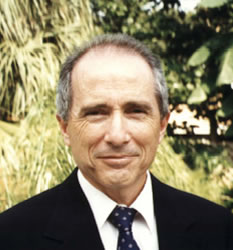Richard H. Fillon, 2005 Distinguished Service Award
 Richard
H. "Dick" Fillon has been working as a geologist since receiving
a Ph.D. from the University of Rhode Island in Geological Oceanography
in 1972. His educational and research experience in the geological sciences
has been broad based and excellent. His professional educational career
started with a BS degree in geology from Rensselaer Polytechnic Institute
followed by an M.S. degree in geology from the University of Vermont.
After the M.S. degree he started a Ph.D. program at Florida State University
but after a year transferred to the University of Rhode Island. Following
his Ph.D. degree, Dick pursued a growing interest in geologic oceanography-marine
geology as a postdoctoral fellow at Woods Hole Oceanographic Institution
and as a visiting scientist at Lamont-Doherty Earth Observatory at Columbia
University. During his tenure at Lamont Doherty (1975-1976) Dick worked
on such important research topics as global climate change and paleooceanographic
events that affected the Labrador Sea and North Atlantic. After leaving
Lamont-Doherty Dick spent several productive years (1976-1981) as a research
scientist with the Bedford Institute of Oceanography in Nova Scotia. He
led a research program designed to develop a better understanding of both
the geology and oceanography of the Labrador Shelf and was the external
advisor for students from other universities, McGill and Dalhonsie.
Richard
H. "Dick" Fillon has been working as a geologist since receiving
a Ph.D. from the University of Rhode Island in Geological Oceanography
in 1972. His educational and research experience in the geological sciences
has been broad based and excellent. His professional educational career
started with a BS degree in geology from Rensselaer Polytechnic Institute
followed by an M.S. degree in geology from the University of Vermont.
After the M.S. degree he started a Ph.D. program at Florida State University
but after a year transferred to the University of Rhode Island. Following
his Ph.D. degree, Dick pursued a growing interest in geologic oceanography-marine
geology as a postdoctoral fellow at Woods Hole Oceanographic Institution
and as a visiting scientist at Lamont-Doherty Earth Observatory at Columbia
University. During his tenure at Lamont Doherty (1975-1976) Dick worked
on such important research topics as global climate change and paleooceanographic
events that affected the Labrador Sea and North Atlantic. After leaving
Lamont-Doherty Dick spent several productive years (1976-1981) as a research
scientist with the Bedford Institute of Oceanography in Nova Scotia. He
led a research program designed to develop a better understanding of both
the geology and oceanography of the Labrador Shelf and was the external
advisor for students from other universities, McGill and Dalhonsie.
In 1981 Dick accepted an associated professor of research position at the Belle W. Baruch Institute for Marine Research and a position as senior research associate in the Department of Geology at the University of South Carolina. There, he conducted research on North Atlantic sediment distribution, Gulf of Mexico stratigraphy, and Gulf responses to Late Pleistocene glacial events. He also was instrumental in starting an industry-sponsored educational forum on Gulf of Mexico stratigraphy which introduced him to geologists, geophysicists, and paleontologists working in the oil and gas industry. This program increased his awareness of the spectrum of practical geological problems faced by industry. Industry personnel recognized Dick's extensive experience and interest in a wide range of geologic problems relevant to the oil and gas business. In 1985 Dick accepted a job as an exploration stratigrapher with Texaco Exploration and Production in New Orleans where he worked on both research and applied problems. In 1999 he retired from Texaco and formed Earth Studies Associates, a consulting company where he currently conducts work related to exploration and geoscience research.
Over the distinguished academic and industry career outlined above, Dick has published well over 100 technical papers and abstracts on a wide variety of geologic, oceanographic, and paleontologic topics. His scientific papers, posters, and talks are multidisciplinary, thought provoking, and always well-accepted by scientific peers. A measure of the quality of Dick's scientific products is the number of awards he has won. In the last few years, for example, Dick has two best published paper awards from GCAGS "Lower Miocene Early Pliocene Deposystems in the Gulf of Mexico: Regional Sequence Relationships" in 2000 and "Multiple Overlapping Foraminiferal Litho-Biofacies: Applications to Deep Water Sedimentology and Reservoir Properties of turbidites" in 2003. He also won AAPG's best international poster award in 2004 for a poster entitled "Deltaic Deposits and Linked Downslope Petroleum Systems."
Dick's involvement in our profession has not been limited to research, teaching, and job-related applications of his geologic knowledge. Dick has always been active in professional meetings as an organizer of special sessions, a participant in committee work for local and national professional societies, and a driving force behind research conferences, particularly the GCSSEPM Bob F. Perkins Research Conferences. Dick was instrumental in organizing the 21st GCSSEPM Research Conference entitled "Petroleum Systems of Deep-Water Basins: Global and Gulf of Mexico Experience" and a major driver of the 23rd Annual Research Conference, "Shelf Margin Deltas and Linked Down-Slope Petroleum systems." Both of these meetings were very successful and the proceedings will be referenced by geoscientists for many years to come. Dick also served GCSSEPM as president in 2003. He frequently volunteers his time to aid professional societies and their activities without any prospect of a reward or notoriety for himself. Dick's keen intellect, good sense of humor, and selfless, easy going manner make him a valued scientific colleague and friend to many of us in the geosciences. Outside of his first love, his treasured family, wife Jerri and daughters Emily and Liz, Dick has a special love for the geosciences that is contagious. His enthusiasm and in-depth understanding of an amazing number of facets of geology are an inspiration to all who have worked with him. It is certainly appropriate that the GCSSEPM Distinguished Service Award be granted to Dick Fillon. His tireless service to our profession has been exemplary. We congratulate him on this well-deserved honor.
Harry H. Roberts
